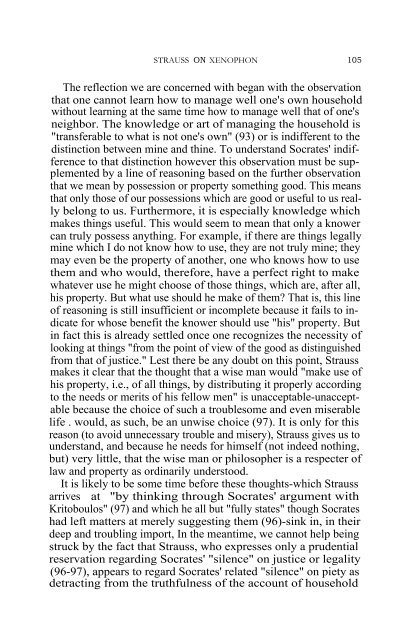Strauss on Xenophon's Socrates Xenophon's Socratic Discourse: An ...
Strauss on Xenophon's Socrates Xenophon's Socratic Discourse: An ...
Strauss on Xenophon's Socrates Xenophon's Socratic Discourse: An ...
You also want an ePaper? Increase the reach of your titles
YUMPU automatically turns print PDFs into web optimized ePapers that Google loves.
STRAUSS ON XENOPHON 105<br />
The reflecti<strong>on</strong> we are c<strong>on</strong>cerned with began with the observati<strong>on</strong><br />
that <strong>on</strong>e cannot learn how to manage well <strong>on</strong>e's own household<br />
without learning at the same time how to manage well that of <strong>on</strong>e's<br />
neighbor. The knowledge or art of managing the household is<br />
"transferable to what is not <strong>on</strong>e's own" (93) or is indifferent to the<br />
distincti<strong>on</strong> between mine and thine. To understand <strong>Socrates</strong>' indifference<br />
to that distincti<strong>on</strong> however this observati<strong>on</strong> must be supplemented<br />
by a line of reas<strong>on</strong>ing based <strong>on</strong> the further observati<strong>on</strong><br />
that we mean by possessi<strong>on</strong> or property something good. This means<br />
that <strong>on</strong>ly those of our possessi<strong>on</strong>s which are good or useful to us really<br />
bel<strong>on</strong>g to us. Furthermore, it is especially knowledge which<br />
makes things useful. This would seem to mean that <strong>on</strong>ly a knower<br />
can truly possess anything. For example, if there are things legally<br />
mine which I do not know how to use, they are not truly mine; they<br />
may even be the property of another, <strong>on</strong>e who knows how to use<br />
them and who would, therefore, have a perfect right to make<br />
whatever use he might choose of those things, which are, after all,<br />
his property. But what use should he make of them? That is, this line<br />
of reas<strong>on</strong>ing is still insufficient or incomplete because it fails to indicate<br />
for whose benefit the knower should use "his" property. But<br />
in fact this is already settled <strong>on</strong>ce <strong>on</strong>e recognizes the necessity of<br />
looking at things "from the point of view of the good as distinguished<br />
from that of justice." Lest there be any doubt <strong>on</strong> this point, <str<strong>on</strong>g>Strauss</str<strong>on</strong>g><br />
makes it clear that the thought that a wise man would "make use of<br />
his property, i.e., of all things, by distributing it properly according<br />
to the needs or merits of his fellow men" is unacceptable-unacceptable<br />
because the choice of such a troublesome and even miserable<br />
life . would, as such, be an unwise choice (97). It is <strong>on</strong>ly for this<br />
reas<strong>on</strong> (to avoid unnecessary trouble and misery), <str<strong>on</strong>g>Strauss</str<strong>on</strong>g> gives us to<br />
understand, and because he needs for himself (not indeed nothing,<br />
but) very little, that the wise man or philosopher is a respecter of<br />
law and property as ordinarily understood.<br />
It is likely to be some time before these thoughts-which <str<strong>on</strong>g>Strauss</str<strong>on</strong>g><br />
arrives at "by thinking through <strong>Socrates</strong>' argument with<br />
Kritoboulos" (97) and which he all but "fully states" though <strong>Socrates</strong><br />
had left matters at merely suggesting them (96)-sink in, in their<br />
deep and troubling import, In the meantime, we cannot help being<br />
struck by the fact that <str<strong>on</strong>g>Strauss</str<strong>on</strong>g>, who expresses <strong>on</strong>ly a prudential<br />
reservati<strong>on</strong> regarding <strong>Socrates</strong>' "silence" <strong>on</strong> justice or legality<br />
(96-97), appears to regard <strong>Socrates</strong>' related "silence" <strong>on</strong> piety as<br />
detracting from the truthfulness of the account of household

















